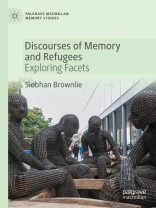This book explores the discourse by and about refugees and asylum seekers in relation to memory with a particular focus on the United Kingdom. A series of studies using different analytical approaches is undertaken, and together the studies shed light on this overlooked area of research. The studies or ‘facets’ presented in the monograph cover a range of contexts and discursive genres: a joint BBC/refugee-authored television documentary, refugees’ oral histories, creative life writing by asylum seekers, parliamentarians’ debates, a reworking of canonical texts and sites in a protest campaign, and non-fiction testimonies and fictional works by later generations of refugee background. The monograph introduces ‘facet methodology’ to memory studies, arguing that this approach could encourage interdisciplinary research in the field.
Cuprins
1. A Dual Focus.- 2. Capturing Memories on Camera: Refugees and the BBC.- 3.Oral Histories: Voices of Kosovo in Manchester.- 4. ‘Women Asylum Seekers Together’ Life Writing.- 5. ‘History’ and Debating Refugees in Parliament.- 6. Memory Sites of the ‘Refugee Tales’ Project.- 7. Bhabha’s Temporality in Second and Third Generation Refugee/Immigrant Testimonies.- 8. Memory, Art and the Vietnamese Diaspora.- 9. Insights.
Despre autor
Siobhan Brownlie is a Lecturer in Intercultural Communication at the University of Manchester, UK. She has previously published two monographs in the field of memory studies: Memory and Myths of the Norman Conquest (2013) and Mapping Memory in Translation (2016).












